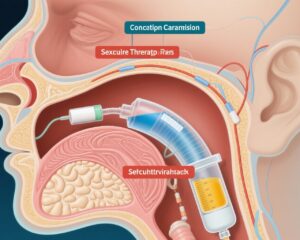Highlight
1. The ACCORD randomized clinical trial showed that camrelizumab combined with capecitabine and radiotherapy significantly improved overall and recurrence-free survival in patients with resectable extrahepatic cholangiocarcinoma and gallbladder cancer.
2. The combination therapy demonstrated a well-tolerable safety profile with no treatment-related deaths and high completion rates.
3. This study fills the gap of effective adjuvant options specific to extrahepatic cholangiocarcinoma and gallbladder cancer, distinct from intrahepatic cholangiocarcinoma.
4. Further investigation comparing this regimen to active chemotherapy or chemoradiotherapy is warranted.
Study Background and Disease Burden
Extrahepatic cholangiocarcinoma (EHC) and gallbladder cancer (GBC) constitute the majority of biliary tract cancers and possess unique molecular and clinical characteristics compared to intrahepatic cholangiocarcinoma. Despite surgical resection being the main curative approach, recurrence rates remain high, and effective adjuvant therapies are scarce. Conventional chemotherapy or chemoradiotherapy in this setting offers limited survival benefit, underscoring a considerable unmet need for improved postoperative treatment options. Immunotherapy has emerged as a promising modality in various solid tumors by harnessing the host immune system, but its role combined with chemoradiation in EHC and GBC remains underexplored until this study.
Study Design
The ACCORD randomized controlled trial enrolled 93 patients with histologically confirmed resectable EHC or GBC from April 2020 to June 2022. After curative surgical resection, patients were randomized in a 1:1 ratio to receive either adjuvant immunotherapy combined with chemoradiotherapy or observation. The intervention group received camrelizumab, an anti-PD-1 monoclonal antibody, administered every three weeks starting postoperatively. Following two cycles, patients received concurrent capecitabine chemotherapy alongside radiotherapy. The observation group received no adjuvant anticancer therapy unless relapse occurred. Primary and secondary endpoints included overall survival (OS), recurrence-free survival (RFS), and safety. Data analysis was conducted between June and August 2024.
Key Findings
Among the 93 patients (median age 62 years; 52% female), baseline demographics and clinical characteristics were well balanced between groups. Median follow-up was 36 months. Significant improvements were observed with the combined treatment versus observation:
- Overall Survival: At 1, 2, and 3 years, OS rates for the combination group were 95.7%, 71.4%, and 58.2% respectively, compared to 80.9%, 52.9%, and 30.5% in the observation group (hazard ratio [HR] 0.43, 95% CI 0.24-0.79, P = .004).
- Recurrence-Free Survival: Corresponding RFS rates at 1, 2, and 3 years were 78.3%, 54.0%, and 40.3% versus 55.3%, 27.0%, and 17.2%, favoring the combination therapy (HR 0.46, 95% CI 0.28-0.76, P < .001).
Treatment was generally well tolerated; only 6 patients (13%) experienced treatment delays for camrelizumab. Importantly, all patients completed the concurrent chemoradiation course, and no treatment-related mortality was reported.
Expert Commentary
This landmark trial importantly addresses a paucity of data regarding effective adjuvant therapy specifically for resected EHC and GBC patients. The addition of camrelizumab to the standard chemoradiation regimen confers a substantial survival benefit, likely by enhancing antitumor immune responses alongside cytotoxic effects. While the lack of an active chemotherapy control group limits direct comparative conclusions, the robust hazard ratios and survival gains support the clinical utility of integrating immunotherapy in this setting. The favorable safety profile further encourages broader application. Future studies should validate these findings in larger cohorts and explore biomarkers predictive of response to optimize patient selection.
Conclusion
The ACCORD trial establishes a new potential standard for adjuvant treatment in resectable extrahepatic cholangiocarcinoma and gallbladder cancer by demonstrating superior survival outcomes with camrelizumab plus concurrent capecitabine and radiotherapy compared to observation. The regimen’s manageable safety profile and high treatment adherence highlight its feasibility in clinical practice. These promising results warrant further confirmatory trials against active treatment controls to define its role firmly in multidisciplinary care paradigms for biliary tract cancers.
References
1. Xiao H, Ji J, Li S, et al. Adjuvant Chemoradiation and Immunotherapy for Extrahepatic Cholangiocarcinoma and Gallbladder Cancer: A Randomized Clinical Trial. JAMA Oncol. 2025 Jul 10:e251926. doi: 10.1001/jamaoncol.2025.1926. PMID: 40638104.
2. Bridgewater J, Galle PR, Khan SA, et al. Guidelines for the diagnosis and management of cholangiocarcinoma: an update. Gut. 2014;63(8):1380-1396.
3. Ghidini M, Lopes G, Armandi A, Ielasi L, Lampis A, Pietrantonio F. New and emerging systemic therapeutic options for cholangiocarcinoma. Expert Opin Investig Drugs. 2021;30(7):697-712.


